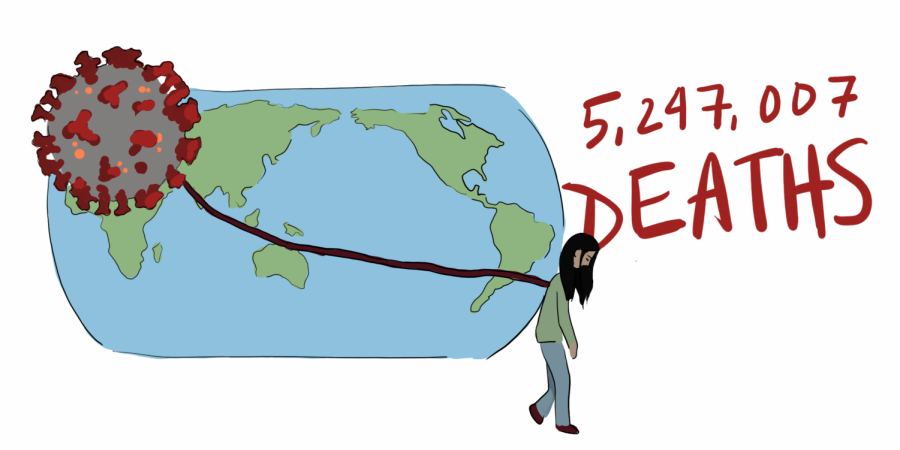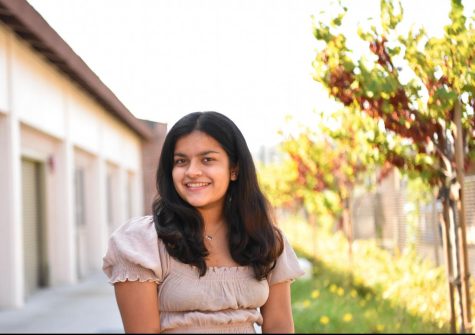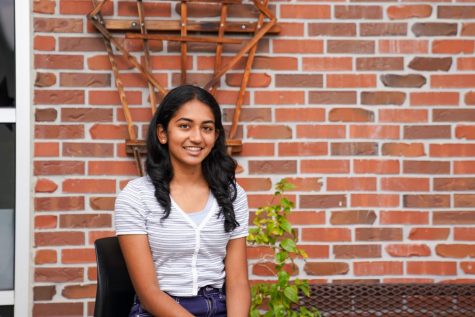MVHS students face loss during the COVID-19 pandemic
Reflecting on the hardship of losing loved ones to COVID-19
The total number of international COVID-19 deaths according to Worldmeter.
December 10, 2021
While preparing to take a Biology exam in October of 2020, sophomore Ananya Nadathur received the news — her grandfather had passed away in Coimbatore, India from COVID-19. Due to COVID-19 restrictions, she hadn’t been able to make her annual summer visit to her family in India and she says she faced a slightly different version of the six stages of grief due to complications from the pandemic.
“I was like, ‘OK, this isn’t possible’ because [my grandfather] was really healthy — he’d take long walks and he was fit,” Nadathur said. “Then after that, [I] was really upset because of the circumstances around it. And then bargaining, but then, I think the depression stage lasted for months after that. [But] I’ve accepted it now.”
Nadathur remembers crying a lot on the day she found out about her grandfather’s death, yet not crying at all during the following week. To cope, she FaceTimed her grandmother, who had recently recovered from COVID-19, spent time with her 12-year-old sister and looked through old pictures. However, it was harder to manage her grief because her dad flew to India, so she couldn’t talk to him while he was traveling.
She recalls her grandfather being “really supportive” and reminding her “to have fun with things.” A memory Nadathur associates with her grandfather was when her family drove up to Ooty, India, and saw an elephant cross the road, along with a group of monkeys and peacocks. Her grandfather got along well with the peacocks and named one of them after an Indian sweet, Ladoo. Nadathur and her sister still have a feather that Ladoo dropped at her grandfather’s door.
Junior Ankita Chaugule also lost her grandfather over the quarantine, on Aug. 8, two days before her birthday. Her grandfather already had a preexisting condition of heart disease when he caught COVID-19 and, two weeks later, he died of a heart attack at the hospital.
While Chaugule had a good relationship with her grandfather, she claims that wasn’t able to develop as close of a relationship with him as she would have hoped. Nevertheless, as the only daughter on her dad’s side of the family, she felt that her grandfather had a special affection for her. She remembers positive memories including showing him around America when he first visited the country, taking him to Napa and San Francisco. She grieved her grandfather’s sudden death by crying for a week before realizing that “it’s happened [and] we have to move forward.”
Because of COVID-19, her family was unable to visit India until 10 months later. Instead, they watched the funeral virtually and did pujas, Hindu worship rituals, at home.
Clinical psychotherapist and owner of Mind Mechanic, Rapid Resolution Therapy, Jordan Boehler explains that the pandemic added new challenges — including not being able to attend in-person funerals — to the grieving process. Despite the availability of virtual services, he mentions a “hollowness” and “sense of unreality” that comes with not being able to attend events in person, and adds that the distance “ties in with guilt and shame.”
Another complication Boehler points out is that “different countries’ responses to COVID-19 and different countries’ access to resources opens up a new realm of anger and frustration possibly at what maybe could have been prevented.”
Nadathur also expressed frustration at seeing people on social media breaking social distancing regulations and felt even more upset after the death of her grandfather.
“Lots of people don’t realize the privilege they have to go out and not worry about not being able to find a good hospital,” Nadathur said. “There are actual lives being lost to this disease and [it’s] really upsetting to see people live in a bubble away from all of that.”
After COVID-19 related deaths caused an increase in the number of clients he works with, Boehler has uncovered a finding when responding to others’ grief — phrases like “Sorry for your loss” to one who lost a family member can be more hurtful than helpful, and can make people feel like “someone is twisting a knife as they remind you of what’s happened.”
“Instead of saying ‘Sorry for your loss,’ what I ask is, ‘Do you still feel connected?’” Boehler said. “And if there is a connection there, it brings their attention back to the fact that this person lives on in some way, either in them or outside of them, which causes an experience of connection which really eases pain, and helps to resolve grief very quickly.”
Nadathur understands that many people don’t know how to comfort people grieving the loss of a family member. However, she finds acts of service — like offering to help her catch up on classes or talking with her — to be more helpful than simply apologizing for her loss.
Now, a year later, both Chaugule and Nadathur share that they have accepted the passing of their family members. However, the loss still affects their lives — when Chaugule traveled to India this June, she felt “odd” because there was no one left in the house after both her grandparents had passed away: she lost her grandmother when she was in fifth grade and now she lost her grandfather, too.
Despite the continued grief that Chaugule experiences, Boehler says that grief doesn’t have to last forever — in fact, he says that his clients often only need one visit to discuss their grief.
“Grief is not for a lifetime,” Boehler said. “It doesn’t need to stick around. You don’t need to grieve more to feel better, just like you don’t need to open a wound deeper to heal it. [If you] cause connection with that person, pain goes away.





























